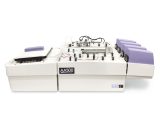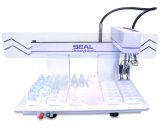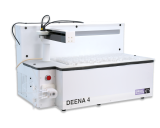Cyanide
Cyanide testing is critical for monitoring water quality, industrial discharge, and product safety in sectors like mining, food production, and tobacco. Automated analysis improves efficiency, ensures regulatory compliance, and eliminates labor-intensive steps like manual distillation. SEAL Analytical’s advanced systems provide precise, high-throughput cyanide detection for laboratories managing environmental and industrial testing.
Why is Cyanide Analysis Important?
Cyanide analysis is critical in environmental, industrial, and public health applications due to cyanide’s toxicity and its presence in various natural and industrial processes. Accurate and reliable cyanide testing for total cyanide, free cyanide available cyanide, and other species helps laboratories meet regulatory standards, protect ecosystems, and ensure public safety. From municipal water utilities to mining operations, cyanide analysis is an essential tool for safeguarding environmental and human health.
In environmental analysis, cyanide monitoring plays a vital role in water and wastewater management. Cyanide can enter natural waterways through industrial discharge, mining runoff, and manufacturing processes, posing significant risks to aquatic life and ecosystems even at trace levels. By routinely testing for free and total cyanide, laboratories help ensure compliance with environmental regulations, prevent ecological damage, and protect drinking water sources from contamination.
Industrially, cyanide analysis is equally important in sectors such as mining, food and beverage, and tobacco. Gold mining and metal processing depend on cyanide for leaching precious metals from ores, requiring careful monitoring of effluents to ensure environmental discharge compliance. In food products like cassava and almonds, cyanide occurs naturally and must be closely monitored to meet safety standards. Similarly, the tobacco industry relies on cyanide testing to ensure product safety and regulatory compliance. Across all applications, automated cyanide testing solutions improve efficiency and accuracy, enabling laboratories to confidently meet today’s complex analytical demands.
What's the Automation Advantage?
| 1. Streamlined Workflows and Increased Efficiency: Automating cyanide analysis eliminates labor-intensive manual steps as well as distillation and digestion. With fully automated start-up and shut-down for unattended operation, this dramatically increases throughput, allowing laboratories to meet rising sample demands without adding strain on staff or extending turnaround times. | 2. Enhanced Accuracy and Reproducibility: Automated systems ensure consistent sample preparation, reagent addition, and analysis across all samples, reducing the potential for human error and improving data quality. Features like dual-beam photometers and real-time temperature monitoring optimize reaction and analysis conditions, delivering reproducible results even for complex matrices such as wastewater and industrial discharge. | |
| 3. Flexibility to Analyze Multiple Parameters: Modern analyzers can automate a range of cyanide species and additional parameters like ammonia, nitrate, nitrite, and more. This versatility enables laboratories to maximize the value of their instruments, streamlining environmental compliance workflows, nutrient analysis, or industrial quality control processes—all on one platform. | 4. Freeing Analysts for High-Value Tasks: By automating repetitive tasks, analysts are untethered from the benchtop, allowing them to focus on more critical responsibilities like data interpretation, troubleshooting, and method development. This not only boosts overall laboratory productivity but also reduces burnout and increases job satisfaction for laboratory staff. |
Automating cyanide testing and sample preparation is more than just a time-saver—it ensures consistent, high-quality results and provides laboratories with the flexibility to meet evolving analytical challenges. From monitoring industrial discharge to ensuring food and water safety, automation equips labs with the tools needed to stay ahead in today’s fast-paced testing environments.
SEAL Analytical's Expertise in Automated Cyanide Analysis
For over 60 years, SEAL Analytical has been at the forefront of automating environmental and industrial testing methods, providing laboratories with robust, reliable solutions for precise nutrient and contaminant analysis. Our legacy stems from the revolutionary AutoAnalyzer II, originally developed by Technicon and later advanced by Bran+Luebbe, which served as the foundation for many of the EPA-approved methods still relied upon today. This legacy of innovation and expertise continues with SEAL Analytical’s modern AutoAnalyzer product line, which builds on decades of proven technology and method development.
SEAL’s commitment to innovation is matched by the expertise of our global team of chemists and engineers with deep experience in laboratory processes and the environmental testing industry. Our support and sales team’s chemistry background ensures that we not only understand the complexity of cyanide testing but can also provide solutions that simplify workflows and improve accuracy. For cyanide analysis, our continuous flow analyzers offer advanced inline gas diffusion with amperometric detection, allowing for the seamless measurement of free and total cyanide without the need for labor-intensive manual distillation. This streamlined approach enhances laboratory efficiency while delivering precise, regulatory-compliant results.
By combining decades of methodological development, cutting-edge technology, and unmatched technical support, SEAL Analytical empowers laboratories to meet the challenges of cyanide analysis and beyond. Whether addressing environmental compliance, industrial quality control, or research needs, SEAL remains a trusted partner in delivering innovative solutions for automated testing.
Key Cyanide Methods and Features
SEAL Analytical’s expertise in cyanide analysis covers a wide range of approved methods, including for Total Cyanide, Available Cyanide, or Free Cyanide. Our instrumentation automates methods according to 40 CFR 136, 40 CFR 141, and other regulatory guidelines. Common reference methods for SEAL's cyanide method library include:
For methods requiring distillation, our continuous flow analyzers—such as the QuAAtro39 AutoAnalyzer, AA10 AutoAnalyzer, and AA500 AutoAnalyzer—offer inline gas diffusion and inline distillation as approved, time-saving alternatives to manual distillation. Inline gas diffusion followed by UV digestion and amperometric detection on the AA500 AutoAnalyzer offers an incredibly streamlined approach to cyanide analysis, eliminating the need for distillation and manual digestion. These systems also offer incredibly low detection limits, allowing drinking water labs to easily meet criteria needed to ensure safe municipal water to the community.
Beyond cyanide detection, SEAL Analytical’s discrete analyzer and continuous flow analyzer product lines support an array of automated processes, including dilution, auto-calibration, automatic QC insertion, and the sequential or simultaneous analysis of multiple parameters. By combining these powerful features with regulatory-approved methods, SEAL Analytical ensures your lab’s cyanide analysis is not only compliant and efficient, but also capable of delivering consistent, precise, and high-quality results.
Compare our Analyzers
Explore the capabilities of each of our product lines below. Our analyzers and robotic systems are capable of analyzing a wide variety of analytes on a single platform. Select a product line to learn more about the capabilities of each system.
Ready to Optimize Your Cyanide Analysis?
Request Information
Fill out the form below to request information about our products and services.


.png?resolution=160x128&quality=95)

